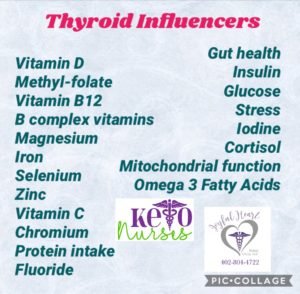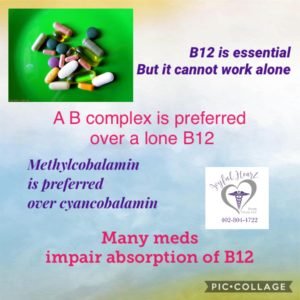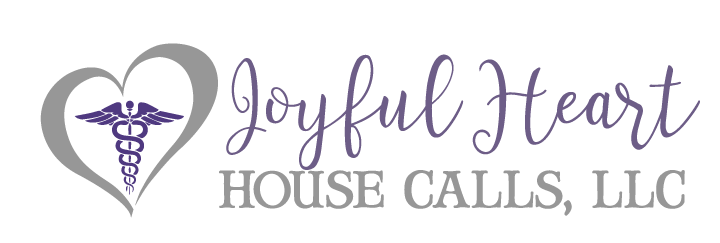As you may know, many diabetics also have to deal with hypothyroidism, a condition where low levels of thyroid hormones cause a myriad of symptoms, including fatigue, cold hands/feet, waking up with a headache that resolves on its own in a few hours, mood swings, feeling depressed, thinning hair or even balding, rough patches of skin, constipation, fluid retention/swelling, abnormal cholesterol levels, or even mild memory problems.
It is quite unfortunate that most general medical practitioners of all levels and professions simply do not understand thyroid health adequately enough to diagnose or even refer to a knowledgeable specialist. In addition, many endocrine specialists often also struggle with full understanding and comprehension of the negative feedback loop of the thyroid hormone process. Most mainstream medical providers only utilize the TSH for determining thyroid health, but that leaves a HUGE portion of the population with symptoms and NORMAL TSH levels. This lack of understanding of the thyroid gland and its functions results in a large number of people suffering with “subclinical hypothyroidism” and even Hashimoto’s because providers don’t fully assess symptoms or draw blood for the entire thyroid panel, including free T3, free T4, & reverse T3. It’s also quite difficult to persuade providers to draw the antibodies tests that are used to identify autoimmune thyroiditis, often called Hashimoto’s. Another issue often arises when providers actually DO order the full thyroid panel and only use the reference ranges provided on the lab results page, overlooking the SYMPTOMS reported by the patient AND not realizing there is a BIG difference in normal ranges and OPTIMAL ranges of values. Sometimes, the panel doesn’t even contain the correct information!
Let’s first discuss the individual tests included in the thyroid panel: TSH, free T3, free T4, reverse T3 and total values. The TSH is the thyroid stimulating hormone and is NOT a direct thyroid lab measure, but it is the most commonly performed thyroid test. The TSH is typically the only thyroid testing drawn by the majority of health care professionals; it is also the only level that most prescribers use to evaluate and adjust thyroid medications. Honestly, though, a large patient population does just fine using this method; however, many do not. The TSH, produced by the pituitary gland, STIMULATES the thyroid gland to secrete more thyroid hormone, or T4. If TSH is LOW, it means your thyroid hormone (T4) may be too high, and so there is LESS of a need for thyroid stimulating hormone (TSH). If the TSH is elevated, it usually means there is inadequate amount of circulating T4 in the bloodstream; this low T4 triggers the increase in STIMULATION, making TSH go up. So, low TSH = HIGH T4, or hyperthyroidism, while HIGH TSH = LOW T4 or hypothyroidism. Optimal TSH range is about .05 – 1.0 mIU/dL, depending on which study/article/author you read, while the normal range is more like 0.4 – 5.5 mIU/dL. However, note that educated prescribers will NOT treat to a TSH alone.
Some prescribers will order TSH and free T4 when managing thyroid medications, and this combination of testing can give better information than TSH alone. T4 is known as thyroxine and is typically recognized as the “storage” form of thyroid hormone; it circulates in the bloodstream, unbound and ready to be converted into T3 to be used by the body. Normal free T4 range is approximately 0.8 – 1.8 ng/dL or so; every lab has its own specific reference range, so be sure to check YOUR specific test results for the MOST accurate information. OPTIMAL free T4 is about 1.4 – 1.58 ng/dL, according to most studies and thyroid experts, levels at 1.0 or so can be ok. Low free T4 level would likely indicate hypothyroidism or UNDER-medication, while an elevated free T4 would indicate hyperthyroidism or OVER-medication with levothyroxine. Note that Free T4 will be converted into T3 as needed, if you have no conversion issues; T4 is not otherwise useful to the body, so if your Free T4 level is not optimal, it’s generally no major issue. Knowing the Free T4 level, though, helps us properly dose your thyroid medications.
Free T3 is rarely assessed by mainstream medical professionals, but it can provide very helpful information on which to base clinical treatment decisions since it is the ACTIVE form of thyroid hormone; free T4 is converted into free T3 as needed to provide adequate hormone regulation. When the body requires more energy, or needs to manage weight, or regulate menstrual/circadian cycles, free T3 is the hormone that the body uses to increase energy, improve weight, or regulate cycles. Normal free T3 levels range is 2.0 – 4.4 pg/mL while OPTIMAL levels range from 3.8 – 4.4 pg/mL. Prescribing liothyronine, T3, is a very effective method of treating T3 levels AND patient symptoms; however, because T3 can be a cardiac stimulant, it is VITAL/IMPERATIVE/ESSENTIAL to monitor vital signs REGULARLY. Keeping a record of vital signs is important so we can SEE early signs of cardiac stimulation IF it’s going to happen. It isn’t real common, but it can occur, especially as the dose of liothyronine is increased over time.
While some thyroid experts compare free T3 to fuel or gas for hormonal regulation, they liken reverse T3 to the brakes of this system. Reverse T3 acts to slow metabolism, reduce energy production, or otherwise act like brakes to thyroid hormone regulation; our bodies always have systems in place to speed/cause/stimulate a processes, but we also have opposing systems in place to slow/stop/depress the same processes. Thyroid balance is quite intriguing and can be very delicate to manage, especially when imbalance in any ONE of these hormones creates imbalances in the processes involved, triggering physical symptoms that impact normal life. Reverse T3 is produced from the same free T4 that is used to make free T3 – it’s a balancing act for sure. Normal reverse T3 range is 9.2 -24 ng/dL, but OPTIMAL level for thos ON THYROID meds is 10-12 ng/dL and for those NOT on thyroid meds, ideal is AROUND 15 ng/dL, but not really higher than 18-20 ng/dL. Knowing the ratio of free T3/reverse T3 can also help us see an imbalance in hormone levels. Calculate the ratio by dividing the numbers; the ratio should be less than 0.2. A higher ratio indicates too much reverse T3 as compared to free T3; once you know this ratio, you can work on improving both levels – either raising free T3 or lowering reverse T3 by reducing T4 intake.
The antibodies that we prescribers should order to determine auto-immune dysregulation of the thyroid include the thyroglobulin antibody and the thyroid peroxidase antibody; both of these should be as near zero as possible; reference ranges are less than 0.9 IU/mL and less than 34 IU/mL respectively. Any elevation in these levels is indicative of an autoimmune process within the body, known as Hashimoto’s. Grave’s hyperthyroidism can be tested with a TSI blood test.
Now that we understand the actual hormones and their jobs, we can discuss how many other chemical imbalances can impact thyroid health. The first of these imbalances we will discuss is low vitamin D; vitamin D is a steroid hormone that regulates a variety of processes and serves as ingredient in many hormones. Vitamin D deficiency has been linked to Hashimoto’s (hypothyroid) and Graves’ disease (hyperthyroid), as well as thyroid tumors. It’s essential for our health to obtain adequate Vitamin D because it plays such important roles in so many body systems and processes; if you choose to supplement a Vitamin D, remember its cofactors: magnesium, Vitamin K2, and iodine.

Speaking of iodine, adequate iodine is also essential for good thyroid health and normal thyroid hormone levels. Some people that go low carb, or even just attempt healthier eating, find they become mildly hypothyroid after some time – usually about a year or so after cutting out processed/packaged foods. Why does this phenomenon occur? Likely because many low carbers change the type of salt they consume; switching from the blue box of processed salt, which is processed to ADD iodine, results in a loss of iodine from our diets. While low carb eating typically is MUCH more nutrient dense, iodine and Vitamin D are in VERY low quantities in any foods at all; so it’s important to get iodine from a quality source. Most of us choose to supplement iodine, but for those with Hashimoto’s, keeping the iodine intake adequate, but low, can be very important; high amounts of iodine can stimulate the thyroid gland inappropriately, worsening symptoms of Hashimoto’s. Some thyroid authors elieve that low iodine is a major cause of Hashimoto’s, while others do not agree. Most thyroid experts recommend keeping iodine intake for those with autoimmune thyroiditis low, to an amount around or less than 150 – 200 mcg per day, although the American Thyroid Association approves up to 500 mcg/day.
Other nutritional deficiencies that can contribute to or have been linked to thyroid imbalance include ferritin, magnesium, selenium, Vitamin B12, Vitamin B1, & zinc. Due to consumer demand in recent years, supplements are now available in support of thyroid health and contain many of these in one tablet, capsule, or dose. Be careful, though, NOT to double-dose or overdose supplements. If you’re taking a B complex vitamin, many of those same ingredients will be included in a thyroid support hormone. So, either: choose 1 or the other, OR alternate days of each.

A few other tips to keep in mind: Hashimoto’s is an auto-immune response of inflammation. Reducing inflammation from everywhere else is vital to best reduction in these antibodies. Inflammation can come from stress, illness, elevated glucose or insulin levels, medications, vegetable/canola/corn oils, processed/nutrient-poor foods, grain intake, and even seasonal/food allergies. Many medications, especially depression/anxiety meds actually induce side effects that MIMIC, , the symptoms of hypothyroidism; it is IMPOSSIBLE to distinguish the source of symptoms when medications are also being used. This statement does NOT mean you should stop meds; that action can result in TERRIBLE impacts. Just realize that at some point, it may be helpful to reduce other medicines, to obtain optimal results. Many people will begin using “adaptogens” to help thyroid or adrenal function; be EXTREMELY cautious with these supplements. Adaptogens can alter your symptoms, hiding or making them worse.

These are the most helpful pieces of info that I share with the majority of patients and prescribers. For more detailed descriptions of thyroid imbalances, I’d recommend these reputable thyroid experts, listed in alphabetical order: Dr. Amy Beard, Dr. Westin Childs, Chris Kresser, or Dr. Isabella Wentz. All have good and trustworthy information and quality resources regarding thyroid health.

References for this article
All Retrieved on November 1, 2019
https://www.ncbi.nlm.nih.gov/pmc/articles/PMC3313737/
Five Thyroid Patterns That Won’t Show Up on Standard Lab Tests
https://www.amymyersmd.com/2016/10/thyroid-lab-results-really-mean/
NOTICE: This content is for informational and educational purposes only. It is not intended to provide medical advice or to take the place of medical advice or treatment from a personal health care professional. All viewers of this content are advised to consult their own qualified health professionals regarding specific health questions. Neither KetoNurses, Joyful Heart House Calls, or the publisher of this content takes responsibility for possible health consequences of any person or persons reading or following the information in this educational content. All viewers of this content, especially those taking prescription or over-the-counter medications, should consult their medical providers before beginning any nutrition, supplement or lifestyle program.


